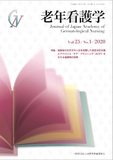Japanese
English
- 販売していません
- Abstract 文献概要
- 参考文献 Reference
抄録
高齢者虐待防止のためのストレス対策への示唆を得るため,介護老人保健施設の看護職および介護職のエイジズム,ストレスと感情労働の関連を明らかにすることを目的とし,無記名自記式質問紙調査を行った.測定尺度は,日本語版Fraboniエイジズム尺度(FSA)短縮版,陰性感情経験頻度測定尺度,感情労働尺度を用い,階層的重回帰分析を行った.その結果,感情労働の「ネガティブな感情表出」に対して,「(高齢者の)わがままや過度な訴えに対する陰性感情」というストレスが強い関連(β=.515,p<.01)を示し,エイジズムの関連は示されなかった.一方,ストレスに対してはエイジズムの「回避」が最も強い関連(β=.373,p<.01)を示した.以上の結果より高齢者に対して怒りを表出する傾向の「ネガティブな感情表出」を軽減するために,いらだち等の陰性感情を調整する能力を高める重要性が示された.また,「回避」を軽減することで,ストレスの発生防止につながる可能性が示唆された.
The survey aimed to elucidate the relationship among workers' ageism, stress, and emotion work to determine stress management measures to prevent elderly abuse. An anonymous self-administered questionnaire survey was conducted for nurses and nursing care workers in geriatric health services facilities. The Japanese version of the Abridged Fraboni Scale of Ageism, Negative Feeling toward Patient Frequency Scale, and the Emotion Work Inventory for Nurses were used to evaluate participants using a 5-point Likert scale, and a hierarchical multiple regression analysis was performed. The results revealed a strong link between the negative emotional expression of emotional labor and the stress of “negative emotions toward the selfishness and excessive complaints” of the elderly (β=.515, p<.01). Furthermore, a connection with ageism was not found. However, ageism avoidance had the strongest link to stress (β=.373, p<.01). The results suggest that it is important to improve the ability to regulate negative emotions such as irritation in order to reduce the negative emotional expression in the form of anger toward the elderly. Further, reducing avoidance could lead to the prevention of stress.
Copyright © 2020, Japan Academy of Gerontological Nursing All rights reserved.


